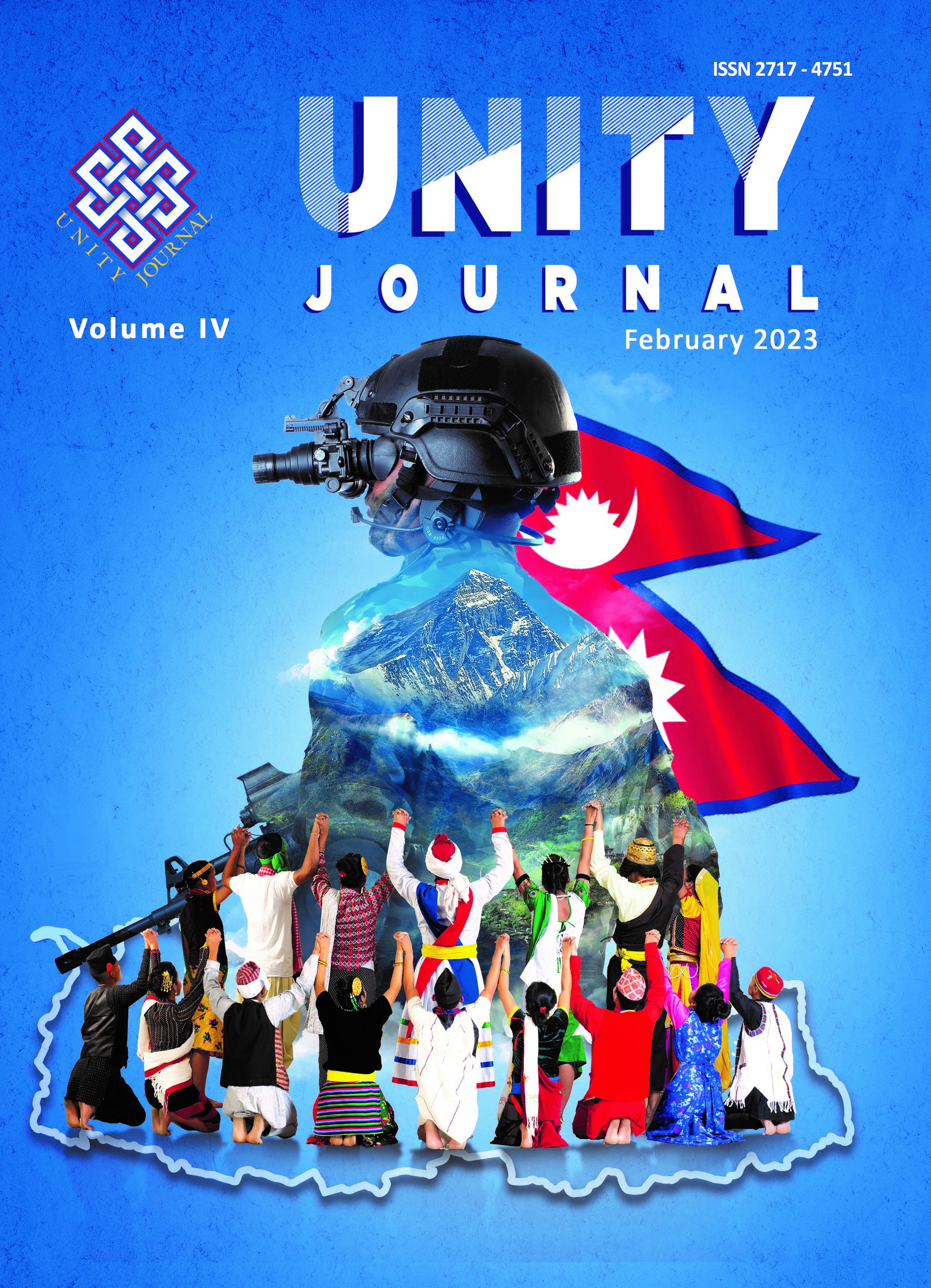नेपालको द्वन्द्व व्यवस्थापनका सहयोगी तर विस्मृत पात्र र पक्षहरु {Helpful but forgotten characters and aspects of Nepal's conflict management}
DOI:
https://doi.org/10.3126/unityj.v4i01.52140Keywords:
Conflict management, peace, insurgencyAbstract
बिक्रम सम्बत २०५२ (सन् १९९६) बाट तत्कालीन नेकपा (माओवादी)ले सुरु गरेको सशस्त्र द्वन्द्वले गर्दा नेपालमा जुन
परिमाणमा मानवीय, सामाजिक र आर्थिक चोट र पीडा पर्न गयो त्यसको पूर्ण तथ्य बाहिर आउने सम्भावना न्यून
छ । द्वन्द्वले साधारण नागरिकको जीवन प्रणाली नराम्ररी बिथोल्यो, हजारौं परिवार बिचल्लीमा परे र अनाहकमा
धेरैले मृत्यु–वरण गर्नुपर्यो। कतिको सिन्दुर पुछियो, नाबालक टुहुरा बने, कमाउने व्यक्ति अस्ताउंदा वृद्ध र बालक
सडकमा धकेलिए । त्यस्तै, सशस्त्र द्वन्द्वले नित्याएको मनोवैज्ञानिक दुष्प्रभावको सही लेखा जोखा पनि कहिल्यै हुन
सकेन । हरेक नेपालीले द्वन्द्व जतिसक्दो चांडो टुङ्गियोस् भन्ने चाहना राखेका थिए । राज्यमा नेपालीले नेपालीलाई
नै मार्ने क्रम रोकिनु पथ्र्यो, धेरैको ज्यान गएपछि मात्र रोकियो। यस क्रममा स्वदेशी र विदेशी धेरै व्यक्ति र
संगठनले आफ्नो स्तरबाट खेल्न सक्ने भूमिका निर्वाह गरे र न्यायोचित जस पनि लिए । तर मुलुकमा थप
रक्तपात जोगाउन अन्य अनगिन्ति व्यक्ति वा समूहले पनि अनौपचारिक वा औपचारिक तहमा आ–आफ्नो तर्फबाट
अहम भूमिका निर्वाह गरे, तर नेपथ्यमै रहे। त्यस्ता गुणकारी व्यक्ति वा संस्थालाई यथोचित नमन गर्नै पर्दछ ।
यसै सन्दर्भमा, नेपालको शान्ति प्रक्रियामा प्रत्यक्ष वा परोक्षरुपले सम्झनयोग्य भूमिका निर्वाह गरी थप रक्तपात
हुनबाट नेपाली समाजलाई जोगाएका केही पात्र र पक्षहरुकाबारे प्रस्तुत लेखमा केही चर्चा गर्ने प्रयास गरिएको छ ।
{Due to the armed conflict started by the then CPN (Maoist) from Bikram Sambat 2052 (year 1996) in Nepal, June
Human, social and economic injuries and pain have been inflicted on the scale, and the full truth is unlikely to come out
is The conflict has severely disrupted the lives of ordinary citizens, leaving thousands of families stranded and helpless
Many had to die. Whose vermilion has been wiped away, minors have become orphans, old people and children have lost their livelihood Pushed into the street. Similarly, there will never be an accurate account of the psychological effects of armed conflict
could not Every Nepali wanted the conflict to end as soon as possible. Nepali to Nepali in the state The killing process had to be stopped, it was stopped only after many people died. In this process, many people, domestic and foreign, and The organization played the role it could play at its level and took whatever was justified. But more in the country Countless other individuals or groups also do their part, informally or formally, to prevent bloodshed Played an important role, but remained in the background. Such meritorious persons or institutions should be properly bowed down. In this context, more bloodshed by directly or indirectly playing a memorable role in Nepal's peace process In this article, an attempt has been made to discuss some of the characters and aspects that saved Nepali society from happening.}
Downloads
Downloads
Published
How to Cite
Issue
Section
License
The articles rest within the authority of the Nepali Army. Only with the Nepali Army's prior permission, can any article in whole or in part from this journal shall be reproduced in any form.

